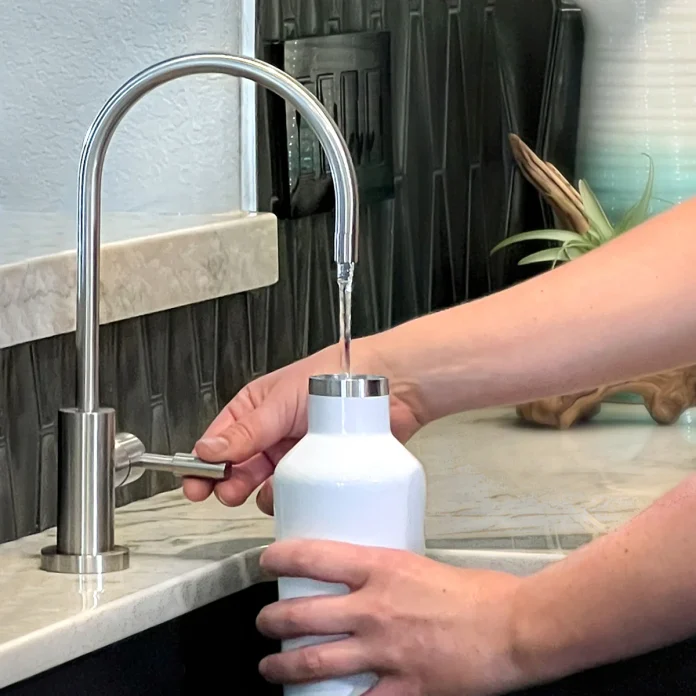In today’s world, having access to clean and safe drinking water is more crucial than ever. With increasing concerns about water quality and contaminants, many homeowners are turning to kitchen water filters as an effective solution. This essential guide will explore various water purification systems, the importance of a drinking water filter, and the benefits of installing a whole house water filter, focusing specifically on kitchen water filters.
Why Are Kitchen Water Filters Essential?
Is Your Drinking Water Safe?
Tap water may contain various impurities, including chlorine, lead, pesticides, and bacteria. These contaminants can adversely affect your health and the taste of your water. Investing in a kitchen water filter can help address these concerns:
• Improved Taste and Odor: Filters remove chlorine and other substances that can affect the flavor and smell of your water.
• Health Safety: A quality kitchen water filter significantly reduces harmful contaminants, providing safer drinking water for you and your family.
• Convenience: Having filtered water at your fingertips eliminates the need for bottled water, saving you time and money.
Types of Kitchen Water Filters
- Activated Carbon Filters: The Flavor Enhancers
Activated carbon filters are the most common type of kitchen water filter. They use activated carbon to absorb impurities and contaminants, effectively improving the taste and odor of your drinking water.
Advantages:
• Removes chlorine, sediment, and volatile organic compounds (VOCs).
• Affordable and easy to install.
• Available in various forms, including faucet-mounted, pitcher, and under-sink filters.
Limitations: While excellent for improving taste, activated carbon filters may not effectively remove heavy metals or certain bacteria.
- Reverse Osmosis Systems: The Ultimate Purification
Reverse osmosis (RO) systems are among the most effective water purification systems available. These systems use a semi-permeable membrane to remove a wide range of contaminants, including salts, heavy metals, and microorganisms.
Advantages:
• Comprehensive filtration, removing up to 99% of contaminants.
• Ideal for households with high levels of impurities in their water supply.
• Provides clean, great-tasting water for drinking and cooking.
Limitations: RO systems can waste water during the purification process and may require more frequent maintenance.
- UV Water Purifiers: The Germ Fighters
Ultraviolet (UV) water purifiers utilize UV light to kill bacteria, viruses, and other pathogens in your water, making them an excellent choice for disinfection.
Advantages:
• Highly effective at eliminating harmful microorganisms.
• Retains essential minerals in the water.
• Environmentally friendly, with no chemical additives.
Limitations: UV systems typically work best in combination with another filtration method to remove chemical contaminants.
- Whole House Water Filters: The Comprehensive Solution
For homeowners looking for a more extensive solution, whole house water filters treat all the water entering your home. These systems are typically installed at the main water supply line and can be highly effective at addressing various contaminants.
Advantages:
• Provides clean water for all household uses, including bathing and cooking.
• Reduces scale buildup and prolongs the life of appliances.
• Offers peace of mind knowing that all water in your home is filtered.
Limitations: Whole house systems can be more expensive and require professional installation.
Choosing the Right Kitchen Water Filter
- Assess Your Water Quality
The first step in selecting the best kitchen water filter is to assess your water quality. Testing your water for contaminants can help you identify what specific impurities you need to address.
Tip: Consider using a home water testing kit or request a water quality report from your local water authority.
- Determine Your Household Needs
Consider the size of your household and how much filtered water you consume. A larger family will have different requirements compared to a single-person household.
Tip: Look for filters with appropriate flow rates to ensure an adequate supply of purified water for cooking and drinking.
- Evaluate Your Budget
Kitchen water filters come in various price ranges. When choosing a system, consider your budget, including initial costs and ongoing maintenance expenses like filter replacements.
Tip: Factor in the long-term savings from using a filtration system instead of purchasing bottled water.
- Installation and Maintenance Considerations
Different types of water purification systems vary in installation requirements. Some can be easily installed by homeowners, while others may require professional assistance.
Tip: Check for clear installation instructions and maintenance guidelines when selecting a system.
Benefits of Kitchen Water Filters
- Healthier Drinking Water
By filtering out harmful contaminants, kitchen water filters provide you with cleaner and safer drinking water, reducing the risk of waterborne diseases. - Environmental Benefits
Using a kitchen water filter reduces reliance on bottled water, helping to decrease plastic waste and protect the environment.
- Cost-Effective Solution
Although the initial investment in a kitchen water filter may seem significant, it often pays off in the long run by reducing the need for bottled water and minimizing health risks.
Conclusion
Choosing the right kitchen water filter is essential for ensuring your family has access to pure and safe drinking water. With various options available, from activated carbon filters to advanced reverse osmosis systems, it’s important to assess your specific needs and water quality before making a decision.
By investing in a quality water purification system, you can enjoy numerous benefits, including improved taste, enhanced safety, and long-term cost savings. Remember to regularly maintain your filtration system to ensure optimal performance and protect your family’s health. Make an informed choice today and enjoy the peace of mind that comes with providing the best possible water for your loved ones. home water filtration system
